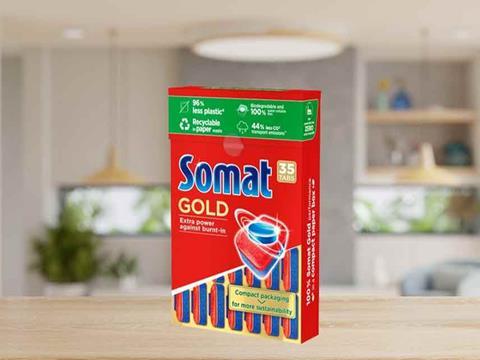
Smurfit Kappa’s SupplySmart digital solution is set to help reduce emissions and increase efficiency across supply chains, with Henkel reporting a 66% reduction in volume and 44% lower carbon emissions during transport for its dishwasher tablet.
SupplySmart is designed to overcome disruptions and complexities in businesses’ supply chains. It draws upon analysis of over 100,000 chains to highlight opportunities for optimization, with a new digital twin feature enabling virtual testing for new packaging designs before they are placed on the market.
Henkel utilized SupplySmart to digitally recreate its supply chain and test ways to introduce a more compact, user-friendly dishwasher tablet pack while lowering its CO2 emissions. The result was a redesign said to offer 66% less volume and reduced emissions of up to 44%.
“Smurfit Kappa’s SupplySmart solution has supported us in achieving a number of our key business objectives,” explained Marcel Daube, International Packaging developer of Henkel’s Consumer Brands division. “It’s not just a change in design; it’s driving sustainability and efficiencies across our entire supply chain.
“Our commitment to responsible business has found its perfect partner in this innovative packaging, helping us reduce waste, minimize our environmental footprint, and deliver on our sustainability objectives.”
Gérard van den Boogaard, Smurfit Kappa Supply Chain Innovation director, continued: “We’ve seen how businesses are increasingly assessing how they can best manage their supply chains to address growing complexities and risk alongside keeping costs down and meeting their sustainability goals. Our enhanced SupplySmart digital tool provides our customers with a risk-free solution for realizing efficiencies and improvements across their supply chain, enabling them to better respond to market opportunities.
“It can also identify where sometimes the simplest packaging changes, such as packaging orientation, can lead to significant reductions in both waste and emissions. At Smurfit Kappa, we are creating packaging that delivers on a low-carbon, circular future.”
Supply chain disruptions across Europe increased by 38% in 2022, according to data released by Resilinc. It attributes the increase to factory fires, mergers and acquisitions, business sales, and the socio-political climate.
In a bid to generate real-time data measuring the carbon footprints of products, Wiliot developed its IoT platform for the supply chain, which was announced as a Sustainability Awards winner under the commercialized Active & Intelligent category.
If you liked this article, you might also enjoy:
The L’Oréal approach to packaging sustainability
The way we talk about plastic needs to change – here’s how to get it right
What steps is Apple taking to make its packaging more sustainable?














No comments yet